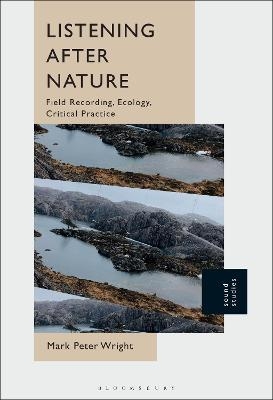
Listening After Nature
Field Recording, Ecology, Critical Practice
Seiten
2022
Bloomsbury Academic USA (Verlag)
978-1-5013-5451-9 (ISBN)
Bloomsbury Academic USA (Verlag)
978-1-5013-5451-9 (ISBN)
Listening After Nature examines the constructions and erasures that haunt field recording practice and discourse. Analyzing archival and contemporary soundworks through a combination of post-colonial, ecological and sound studies scholarship, Mark Peter Wright recodes the Field; troubles conceptions of Nature; expands site-specificity; and unearths hidden technocultures. What exists beyond the signal? How is agency performed and negotiated between humans and nonhumans? What exactly is a field recording and what are its pedagogical potentials?
These questions are operated by a methodology of listening that incorporates the spaces of audition, as well as Wright’s own practice-based reflections. In doing so, Listening After Nature posits a range of novel interventions. One example is the “Noisy-Nonself,” a conceptual figuration with which to comprehend the presence of reticent recordists. “Contact Zones and Elsewhere Fields” offers another unique contribution by reimagining the relationship between the field and studio. In the final chapter, Wright explores the microphone by tracing its critical and creative connections to natural resource extraction and contemporary practice.
Listening After Nature auditions water and waste, infrastructures and animals, technologies and recordists, data and stars. It grapples with the thresholds of sensory perception and anchors itself to the question: what am I not hearing? In doing so, it challenges Western universalisms that code the field whilst offering vibrant practice-based possibilities.
These questions are operated by a methodology of listening that incorporates the spaces of audition, as well as Wright’s own practice-based reflections. In doing so, Listening After Nature posits a range of novel interventions. One example is the “Noisy-Nonself,” a conceptual figuration with which to comprehend the presence of reticent recordists. “Contact Zones and Elsewhere Fields” offers another unique contribution by reimagining the relationship between the field and studio. In the final chapter, Wright explores the microphone by tracing its critical and creative connections to natural resource extraction and contemporary practice.
Listening After Nature auditions water and waste, infrastructures and animals, technologies and recordists, data and stars. It grapples with the thresholds of sensory perception and anchors itself to the question: what am I not hearing? In doing so, it challenges Western universalisms that code the field whilst offering vibrant practice-based possibilities.
Mark Peter Wright is Reader in Critical Sound Practice at the University of the Arts, London, UK, where he is also a member of CRiSAP (Creative Research into Sound Arts Practice). His practice intersects sound arts, ecology, and experimental pedagogy across exhibition, performance, and publishing.
Acknowledgments
Introduction
1. Recoding the Field
2. Constructing Nature
3. Stretching Site
4. Following the Flow
Conclusion: Pressing Record & Pressing Play—On Suspicious Listening & Affirmative Ethics
Bibliography
Index
| Erscheinungsdatum | 26.05.2022 |
|---|---|
| Verlagsort | New York |
| Sprache | englisch |
| Maße | 152 x 229 mm |
| Themenwelt | Kunst / Musik / Theater ► Musik |
| Naturwissenschaften ► Biologie ► Ökologie / Naturschutz | |
| ISBN-10 | 1-5013-5451-5 / 1501354515 |
| ISBN-13 | 978-1-5013-5451-9 / 9781501354519 |
| Zustand | Neuware |
| Haben Sie eine Frage zum Produkt? |
Mehr entdecken
aus dem Bereich
aus dem Bereich


